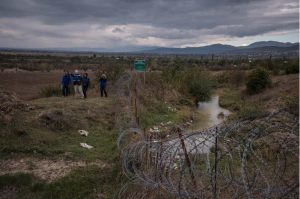By: Johannah Brown
Impunity Watch News Staff Writer
STRASBOURG, France – On April 9, 2024, the European Court of Human Rights (ECHR) delivered a judgment in the case of Georgia v. Russia (IV), where it unanimously found that Russia had committed multiple violations of human rights following its 2008 conflict between Georgia. Specifically, Russia violated Article 2, 3, 5 § 1 and 8, Article 1 and 2 of Protocol No. 1 and Article 2 of Protocol No. 4 of the European Convention on Human Rights.
 |
The conflict began in 2008 when Russia invaded Georgia and began occupying the regions of Abkhazia and South Ossetia. What followed is what is referred to as the “borderiszation” process, which restricted freedom of movement between the occupied territories and Georgia and resulted in numerous human rights abuses.
Russia erected physical barriers, installed surveillance equipment and deployed Russian border guards to the new administrative boundary line (ABL). The measures severely impacted the local Georgian population and people living near or trying to cross the administrative boundaries faced arrests, detentions, and sometimes even fatal incidents if found violating crossing rules. These barriers disrupted daily life, caused families to be separated, denied families access to their farmlands, and restricted children from accessing education in their Georgian language.
The Georgian government filed its application with the ECHR on August 22, 2018, ten years after the conflict began. The Georgian Government alleged that systematic harassment, unlawful arrests, and detention of its citizens led to widespread human rights abuses and violations of rights contrary to several Articles in the Convention of Human Rights.
The ECHR examined evidence, including victim lists, testimonies, forensic reports, and international observations and found a broader pattern of abuse that amounted to an administrative practice. In its decision, the Court noted that the complaints fell under an “administrative practice” of human rights violations, meaning a “repetition of acts incompatible with the Convention” that included an element of ‘official tolerance’ by the State.” The Court held that the Georgian Government had established beyond a reasonable doubt that these violations were officially tolerated by the Russian Government, taking note in its decision that the Russian Government had failed to participate in the proceedings and therefore there was no dispute of the facts.
With regards to Articles 2 and 3 the Court, pointed to evidence of the torture and extra-judicial killings of several residents trying to cross the border as well as the killing of seven pensioners trying to cross the ABL to collect their pension. In finding violations of Article 5, the Court pointed to evidence of at least 2,800 cases of arrest and detention for “illegally crossing.”
The ECHR’s decision comes one year after the Court ordered Russia to pay $134 Million to Georgia in compensation for the 2008 conflict. Georgian Minister of Justice Rati Bregadze commenting on the court’s decision, stated the ruling “underscored Georgia’s territorial integrity and the unlawfulness of the borderization process” and went on to say the ruling was “an important step toward the ultimate goal of achieving the complete de-occupation” of Georgia.
For further information, please see:
European Court of Human Rights – Judgment Georgia v. Russia (IV) – 9 Apr. 2024
European Court of Human Rights – Summary Judgment Georgia v. Russia – 9 Apr. 2024